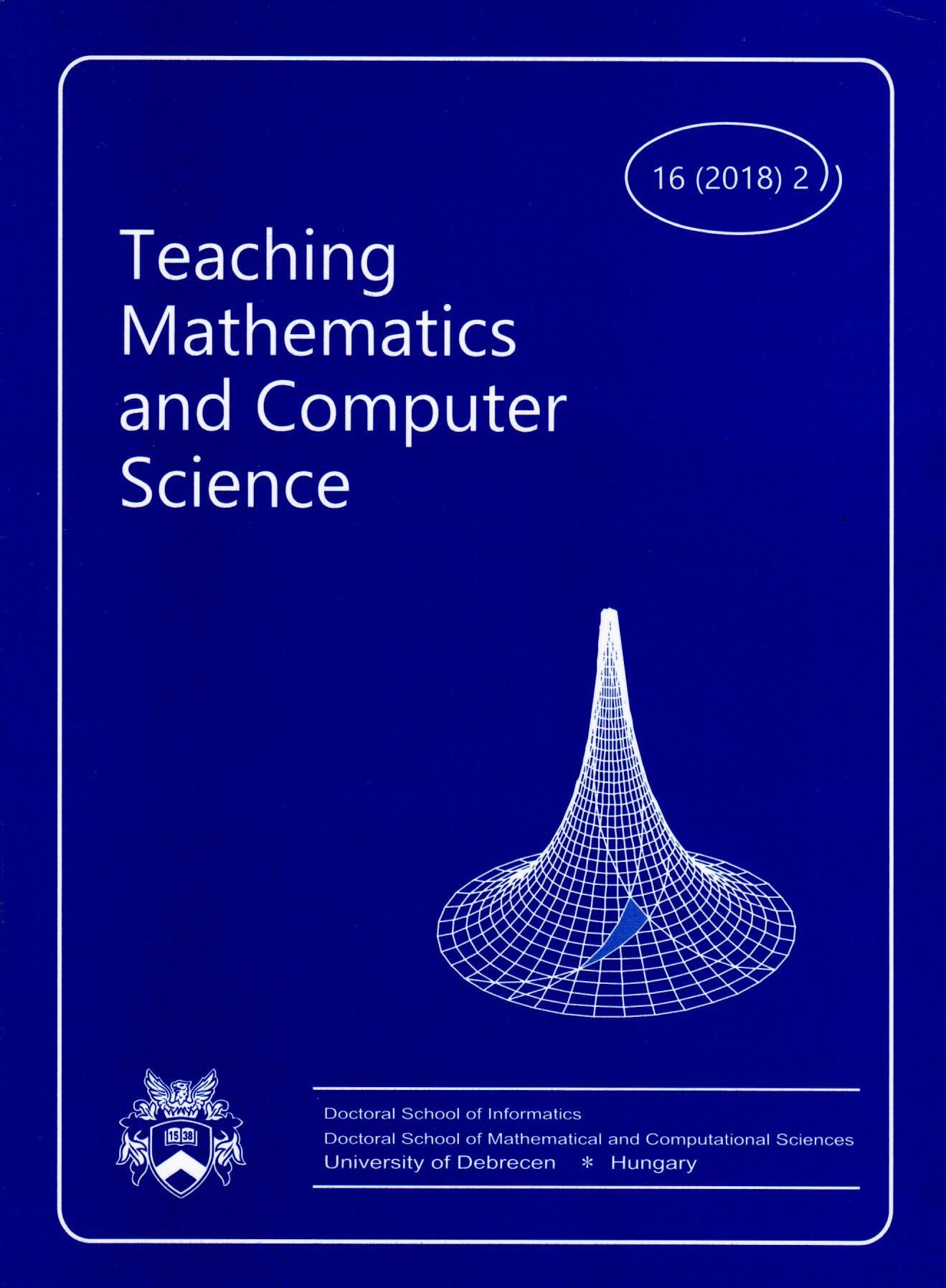Vol. 16 No. 2 (2018)
Published
2018 December 1
##issue.tableOfContents##
Articles
-
Bernd Zimmermann (1946-2018)
155-159Views:149Our great friend, the always helpful supporter of the Hungarian mathematics didactics, Bernd Zimmermann, the retired mathematics didactics professor of Friedrich Schiller University of Jena, passed away on 19th of July 2018. After a short chronology of his life, we remember some of the many areas of his work with strong Hungarian connections.PDF71 -
On some problems on composition of arithmetic functions
161-181Views:132The main goal of this paper is to investigate some problems related to the commutativity of the composition of arithmetic functions. The concept of commutativity arises many times in high school maths, so it is natural to study the composition of functions, namely the equation f(g(n)) = g(f(n)), where f and g are such well known arithmetic functions as d(n), φ(n), σ(n), ω(n), or Ω(n). We study various aspects of solvability: can we exhibit infinitely many solutions; can we determine every solution; can we find suitable values in the range of both functions f and g for which the equation is, or is not solvable, respectively. We need just the basic facts about the above functions,and we use only elementary methods in the proofs. We present some interesting questions, their solutions, and raise some unsolved problems. We found that this topic can be discussed well in secondary school, mainly within the framework of group study sessions as we had some classes with a group of kids in 9th grade. We summarize the experiences of this experiment in the last section.PDF41 -
14 to 18-year-old Hungarian high-school students' view of mathematicians appearing in the media - a case study
183-194Views:136One way to develop positive attitude toward STEM subjects that popular media, including movies and films can be engaged to promote more positive and inclusive STEM images. The movie Hidden numbers offers an opportunity to explore the representations of scholars, especially mathematicians within a biographical drama. Focusing on 5 characters, this article first discusses whether these characters fit into stereotypical scientist image or not. Secondly, we examine how high school students evaluate these characters. We argue that this movie is suitable to promote positive attitude toward STEM subjects.PDF53 -
Mathematical Doctoral School of the Mathematical Seminar of the University of Debrecen at the beginning of the 20th century (Debrecen, 1927-1940)
195-214Views:198In this article, we present the life and carrier of Professor Lajos Dávid, and those 16 mathematical dissertations, along with their authors, which were written under the supervision of Professor Dávid between 1927 and 1940. At the time mentioned, Lajos Dávid was the leader of the Mathematical Seminar of the University of Debrecen. The themes of the dissertations were connected with his scientific work, such as the history of mathematics (the two Bolyais), or his research work in mathematical analysis (arithmetic-geometric mean).PDF99 -
How to teach testing?
215-232Views:209Testing methodology is an important part of IT education. It is desired to show the beginner programmer students the advantage of testing by having them do only a small amount of work. In this paper, we will show how to make testing as a part of programming in simple exercises. These exercises are solved with the analogous programming technique, which is based on programming theorems over enumerators. We have elaborated grey-box test cases for the programs which have been developed based on programming theorems. These test cases can be taught together with the programming theorems, and they can serve as a standard testing procedure for programmers. We also suggest a test tool to automatize test runs, and we will discuss its usage in a short case study.PDF122 -
Overview of the accessibility of webpages, related research, advantages, guidelines and recommendation
233-262Views:195The essay aims to provide a survey of web accessibility, introduce the relevant research results along with describing the advantages of obstacle free webpages. Furthermore, I will attempt to promote the awareness of the significance of accessibility and equal access to information in case of educational webpages especially in the higher education sphere. My primary audience are educational policy makers and leaders of higher education institutions along with in-service teachers who regularly use webpages during their daily work with students struggling with various impairments. The article's focus is expanded onto the relevant professional and legal background, the most important accessibility principles in addition to discussing the tools assuring accessibility and the presentation of best practices for web developers elaborating the electronic learning environments for higher education institutions.PDF148 -
Mathematics teachers' reasons to use (or not) intentional errors
263-282Views:235Mathematics teachers can make use of both spontaneously arising and intentionally planted errors. Open questions about both types of errors were answered by 23 Finnish middle-school teachers. Their reasons to use or not to use errors were analyzed qualitatively. Seven categories were found: Activation and discussion, Analyzing skills, Correcting misconceptions, Learning to live with errors, (Mis)remembering errors, (Mis)understanding error and Time. Compared to earlier results, the teachers placed substantially less emphasis on affective issues, whereas the answers yielded new distinctions in cognitive dimensions. In particular, teachers' inclination to see errors as distractions could be divided into two aspects: students misunderstanding an error in the first place or student forgetting that an error was erroneous. Furthermore, the content analysis revealed generally positive beliefs towards using errors but some reservations about using intentional errors. Teachers viewed intentional errors mainly positively as possibilities for discussion, analysis and learning to live with mistakes.PDF149
Keywords
Issues by Year
2020
2017
2011
2010
2009
2007
2006
2005
2004
2003







